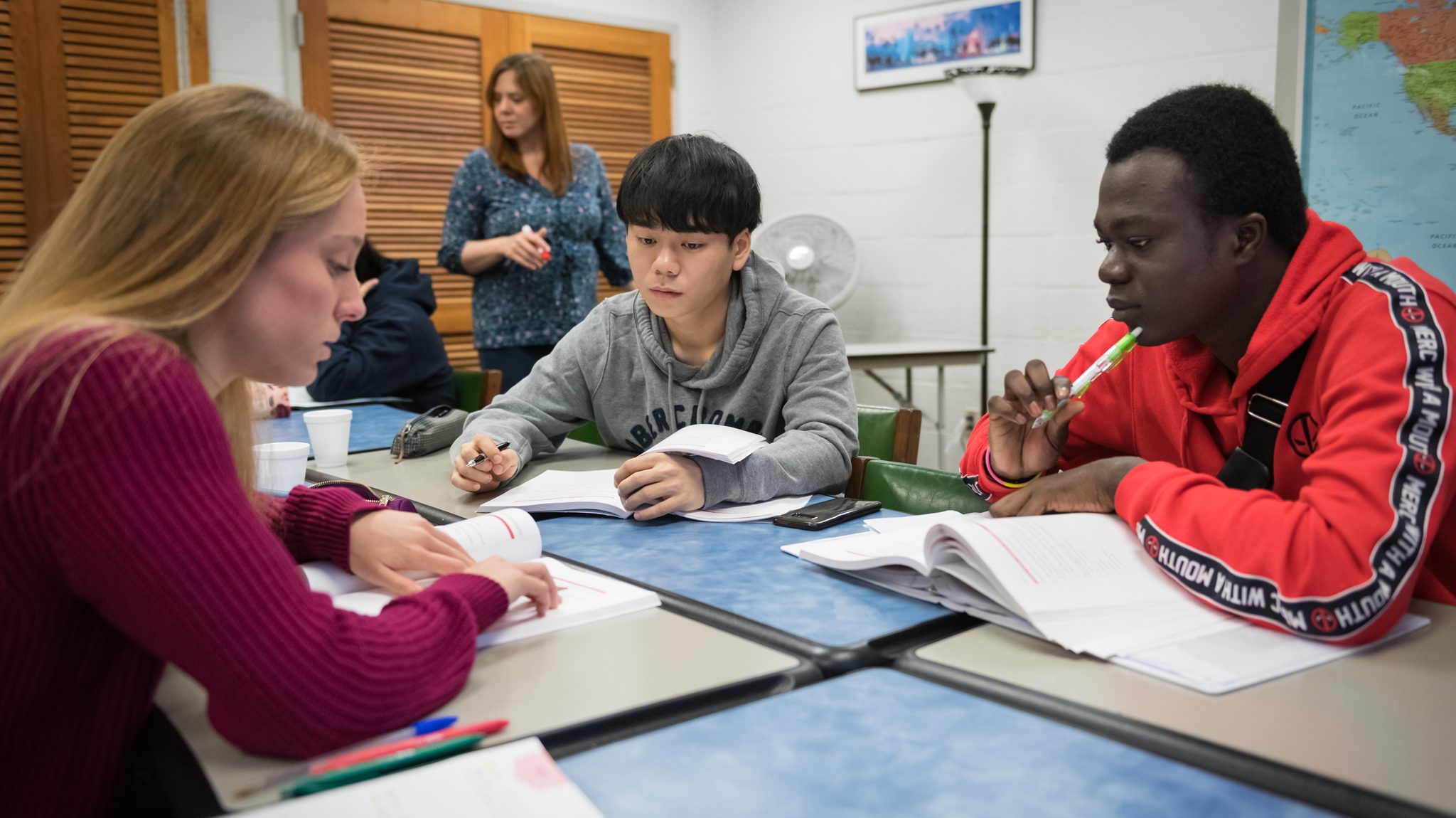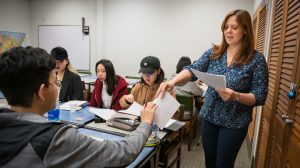
The UM Intensive English Program promotes global citizenship among non-native English speakers from the university and the community, as part of the university’s overall mission to develop a sense of global responsibility. Photo by Megan Wolfe/Ole Miss Digital Imaging Services
OXFORD, Miss – Wenquan Cai came to the University of Mississippi to study mechanical engineering but quickly realized his English wasn’t strong enough to maximize his experience at a major American institution of higher learning.
The native of China wasn’t out of luck. UM’s Intensive English Program, which has been in place under different names at the university since the 1980s, has given him the skills necessary to thrive. He found more resources there than those he needed just to brush up his English.
Students in the IEP also learn about cultural issues and experience many aspects of the unique Ole Miss and Oxford experience.
One year into it, Cai said he has gotten more out of the program than he ever imagined. Besides becoming better with his English, he also has enjoyed group events such as shopping trips to Memphis and informal gatherings to eat or watch movies. His favorite was an IEP trip to NASA’s Marshall Space Flight Center in Huntsville, Alabama.
“I’ve gained a lot,” Cai said. “I’ve met many friends from all over the world. I’ve also met a lot of friendly, kind and knowledgeable teachers.
“Of course, the most important thing is to learn a lot of new things that I have not learned before. Overall, my study experiences at IEP have made me feel happy and relaxed while I do that.”
English classes from basic to advanced levels are offered for students and members of the UM community. The curriculum is designed to prepare students to interact in the English-speaking academic, social and professional world. The program also offers community services initiatives and cultural activities.
The classes take place in the former athletics department building across All-American Drive from Martindale Hall. Students there get to meet others from around the world, and the IEP works as a conduit for those students to become involved in UM organizations and activities.
At its core, IEP promotes global citizenship among non-native English speakers from UM and the community, as part of the university’s overall mission of developing a sense of global responsibility.
Most IEP students are full-time undergraduates, said Whitney Tudor Sarver, senior director of the Intensive English Program. Many of them are visiting students, so they will be here only one or two semesters. Sometimes they change their minds and/or move on to another university and then come back to Ole Miss, she said.
“We try to not only help them develop their language but also integrate into the university, help them make friends and have a good American college experience,” Sarver said. “They meet American students; we take them on field trips and help them have a good experience because the best way for us to get more students is to have them live here and have a good time and tell others.”
“Just like with any university, word-of-mouth is the best way to recruit.”

Ashley Fly (right), a UM Intensive English Program instructor, leads a class designed to help non-native English speakers learn both language and cultural skills. Photo by Megan Wolfe/Ole Miss Digital Imaging Services
Through 18-20 hours of intensive classes each week, the students get classroom instruction on how to write and speak in English, plus a sampling of what to expect from their regular classes. They may find elements of Southern studies, film or English 101 worked into the curriculum, which is taught by instructors with master’s degrees in teaching English as a second language or applied linguistics.
“We are trying to give them a lot of scaffolding and a lot of help, but also showing them what it may look like when they take English 101,” Sarver said.
There’s also a strong support network for students to learn how to navigate college life in a country foreign to them.
“They have a safe place to ask questions, or complain about their roommate, or ask questions about something they need from the pharmacy but don’t know how to say it,” Sarver said. “We want them to understand what it is going to be like.”
The program was recently accredited by the Commission on English Language Program Accreditation for the period December 2018-December 2019 and agrees to uphold the CEA Standards for English Language Programs and Institutions. CEA is recognized by the U.S. Secretary of Education as a nationally recognized accrediting agency for English language programs and institutions in the U.S.
The program plays a major role in the university’s strategic plan and also its goal of educating and engaging global citizens, said Blair McElroy, UM senior international officer and director of Study Abroad. She notes IEP is also valuable because it provides international teaching assistants with strategies to engage students in their classrooms, exposing all students at the university to diverse teaching and learning perspectives.
“The IEP faculty bring their own expertise in teaching and learning to a wider community during International Education Week with presentations, and many also participate in faculty exchanges throughout the world, expanding UM’s global footprint,” McElroy said. “The IEP’s recent accreditation is a testament to the strong academic program that it offers.
“The IEP also engages master’s students in teaching experiences for those enrolled in the teaching English as a second language emphasis through the Department of Modern Languages, where they get real-world experience in research and teaching.”
In addition to the benefits McElroy mentioned, Juwon Ryu, a freshman business major from South Korea, said the network of students from other countries he has found through IEP classes has been valuable. Plus, the program brings together students from many different majors to meet one other.
“The teachers are kind and professional,” Ryu said. “When exchange students come to other countries, there are many difficult factors such as cultural differences and heterogeneity. IEP teachers are interested in students and teach us passionately.”